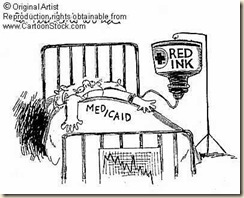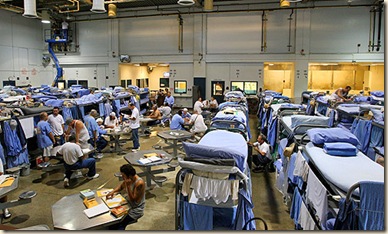Quote of the day:
The great enemy of clear language is insincerity. When there is a gap between one's real and one's declared aims, one turns as it were instinctively to long words and exhausted idioms, like a cuttlefish spurting out ink. - George Orwell

How much will this cost the people of California? (for lawyers)
Attorneys for the people, and the federal government:
Judge blocks state's cut in Medi-Cal fees
San Francisco Chronicle - 08-20-2008 - A federal judge has blocked California's 10 percent cut in Medi-Cal fees for doctors, dentists and pharmacies, saying the money-saving measures appear to violate federal law and would worsen medical care for millions of poor people. In her ruling Monday, U.S. District Judge Christina Snyder of Los Angeles said she was aware of California's gaping deficit, now $17.2 billion (including $2 billion in reserves) with the budget 50 days overdue and legislators still deadlocked. But she said the state has accepted federal funds for Medi-Cal and is bound to use them to provide quality health care to low-income residents... Dr. Richard Frankenstein, president of the California Medical Association, said this was the third ruling in five years to conclude that "the state of California has put at risk the access to health care for millions of Californians by underfunding the Medi-Cal program." He was referring to a previous state attempt to reduce fees to health providers, overturned by the courts

vs.
Attorneys for the State of California
State officials plan to appeal Medi-Cal ruling
Elizabeth Fernandez, Chronicle Staff Writer
Thursday, Aug 21, 2008
(08-20) 18:04 PDT SAN FRANCISCO -- State officials are planning to appeal a federal judge's decision this week that blocked 10 percent cuts in Medi-Cal fees to doctors, pharmacists and other medical professionals.
- The state also plans to ask next week for a reconsideration and a stay of the decision by U.S. District Judge Christina Snyder of Los Angeles, contending her ruling would cost California $575 million a year. The state is confronting a $17.2 billion shortfall for the fiscal year that began on July 1. The state has been without a budget since that date.
"We believe this ruling can be overturned," H.D. Palmer, a spokesman for the California Department of Finance, said today. "When we first proposed (the cut) in January, we knew it was difficult but necessary. We need to achieve these savings."
Doctors and other health-care professionals, however, hailed the ruling, saying it stops Medi-Cal from being decimated. "It really is great news for those who provide health-care, but also for Medi-Cal patients," said Dr. Ronald Labuguen, who sits on the board of the California Academy of Family Physicians. He practices medicine at San Francisco General Hospital.It's been very difficult for patients in a lot of communities to get the kind of care they need," he said. "It is hard to express how big a victory this is. A lot of patients are going to the emergency room or to urgent care services when they could be better served if they had a regular health-care provider."

The Elephant in the Room

Emergency Waiting Room
The 10 percent reductions took effect last month to a large network of doctors, dentists, pharmacists, adult day health centers, and others in the health-care system. Some 6.6 million low-income people receive Medi-Cal.In her ruling, Snyder said Medi-Cal patients would be "irreparably harmed" by the cuts.Dr. Bo Greaves, a Santa Rosa physician who runs a private, primary-care practice, called the decision "a step away from the wrong direction.""The current reimbursement was so substandard - for them to reduce it by another 10 percent was appalling. It would have created a crisis for the entire state," Greaves said.
 and surf the net, read and research my interests in health policy reform. There is no shortage of pundits in this realm. However tonite, as I was watching the olympics with one eye and the proceedings on my laptop my mind forgot all about the
and surf the net, read and research my interests in health policy reform. There is no shortage of pundits in this realm. However tonite, as I was watching the olympics with one eye and the proceedings on my laptop my mind forgot all about the  . It was interesting that in the relays the U.S. team dropped the baton in both the women's and the men's relays. Undoubtedly the United States had the finest track team but 'dropped the ball' and was disqualified. Sound familiar? One could say the same thing about our system....in pieces it is the best health care in the world, however overall we too fail to pass the baton, and are disqualified.
. It was interesting that in the relays the U.S. team dropped the baton in both the women's and the men's relays. Undoubtedly the United States had the finest track team but 'dropped the ball' and was disqualified. Sound familiar? One could say the same thing about our system....in pieces it is the best health care in the world, however overall we too fail to pass the baton, and are disqualified. 















